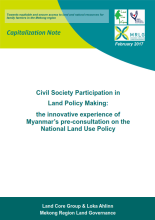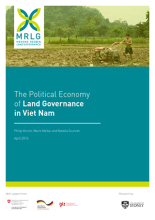Land Library Search
Through our robust search engine, you can search for any item of the over 73,000 highly curated resources in the Land Library.
If you would like to find an overview of what is possible, feel free to peruse the Search Guide.
/ library resources
Showing items 1 through 9 of 10.This Case Study looks at the implementation of the Vacant, Fallow and Virgin Lands Management Law (VFV Law) in seven villages in Sagaing Region, to assess the practices on the ground and how the law impacts the land tenure security of smallholder farmers.
The USAID's Investor Survey on Land Rights aimed to provide a more systematic understanding of the drivers of tenure risk to land-based investments from the perspective of the private sector, and of how investors and operators assess, mitigate and are affected by such risks.
The Mekong Region Land Governance (MRLG) project, MLIKE (Mekong Land Information and Knowledge Exchange), and the Land Portal co-facilitated an online dialogue on “Responsible Large Scale Agricultural Investments in the Mekong Region” on 09-27 October 2017.
In October 2014, for the first time in recent history, the government of Myanmar decided to organize a public consultation to inform the development of a national policy.
This country level analysis addresses land governance in Viet Nam in two ways.
This guide discusses USAID’s recommendations for best practices related to the due diligence and structuring of land-based investments, with the goal of reducing risks and facilitating responsible projects that benefit both the private sector and local communities.
Guest commentary by Robert Oberndorf, Resource Law Specialist, Tenure and Global Climate Change Project.
A guest post by Robert Oberndorf, Resource Law Specialist, Tenure and Global Climate Change Project. Recent rapid changes in Burma have led to concerns related to the land tenure and property rights (LTPR) of smallholder farmers and communities throughout the country.
Property rights are inexorably linked to taxes, largely because property taxes are often one of the easiest taxes to collect, particularly in developing markets with significant informal sectors.







